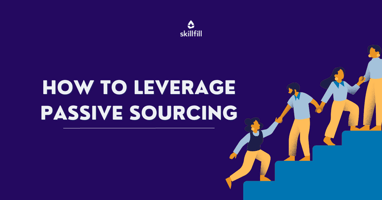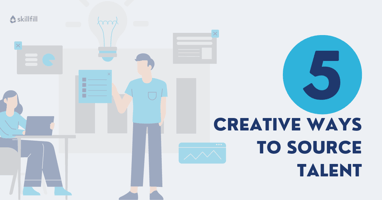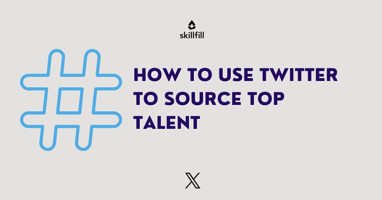In today's competitive job market, finding the right talent can be a difficult and time-consuming...
Empowering People and Finding Top Talent: Insights from Vanessa Raath
Vanessa Raath is a global Talent-Sourcing Trainer. But before that, she was a schoolteacher in the UK, a scuba diving instructor in places like Thailand and Zanzibar, and an agency recruiter in South Africa. The Talent Hunter is Vanessa's one-stop Talent Sourcing Training Company, where she sources top talent across the globe, while training others to do the same. We sat down with Vanessa for an interesting talk about her journey, recruitment, and the HR space.
First things first, how did you go from a schoolteacher to a scuba diving instructor to the Head of Talent Acquisition, to Global Talent Sourcing Trainer? Walk us through that journey.
This is such a valid question because if you look at everything that I've done from being a schoolteacher to a scuba diving instructor, to agency recruiter, internal recruiter, to then starting my own business and working as a trainer, there is the teaching link that stayed throughout the years. I love to empower people and help people to do things better by training them.
The common thread between everything that I've done is people. I've always had people focussed jobs, so I think I've learned a lot about people. For example, when I was a scuba diving instructor, I had dreadlocks, and I was living on an island (my family thought I was nuts). But it showed me how to read someone's behavior at 30 meters under the sea where it's potentially a life-threatening situation. You learn very quickly about people's behavior in these situations. Over time, I understood how to read people and how to network more effectively.
At the end of the day, what truly matters are the skills one gained throughout the time that allow a stellar performance at the job!
You are originally from South Africa, but you’ve lived and worked in Europe and you now have clients all over the world, from Australia to the US. What are the biggest differences and challenges you face when training people from different points of the globe?
I train teams all over the world and what always stands out for me is the people that really want to learn and stand out from the crowd, and do extra homework. These people leave the training knowing more than the others who just view my training as a tick box exercise. They then send me messages to ask more questions and to learn even more. These people want to go the extra mile to be the best version of themselves. People who really want to learn, who are really determined to stand out are the favorite kind of people that I love to train.
This is the same anywhere in the world. Someone might think if I am training a South African team that they're going to be behind the rest of the world. But actually, they are not, to be honest. It's all about having that natural curiosity. So, if you get someone who's got a mindset of “I'm just going to go and figure this out myself”, then they're pretty much going to be on a par with some of the best teams that I'm training across Europe and the US. When people are curious about things, there's nothing to stop them from learning and achieving their personal goals.
That's the beauty of the world these days. Instead of being nervous about ChatGPT, thinking it's going to take my job, it’s more important to experiment with ChatGPT and think how can it help me? Technology is never going to replace the human element. That's our biggest wildcard. There is no point in just sitting in your job, thinking everythings going to stay the same forever because it's not. If you don't keep up, you are not going to be always employed or employable for that matter. That is one thing that COVID has taught us.
Definitely, technology is here to make us more productive, and focus on what really matters. We were talking about having a natural curiosity, and for sure you are a curious and ambitious person. You even launched your own company, a sourcing training business - The Talent Hunter. Can you explain to us what you focus on and what services you offer?
What I discovered when I was working in the recruitment industry was that all of the Recruiters were looking in the same place for candidates. They were literally going fishing in a very tiny pool of LinkedIn and their local job boards. I started thinking “That's ridiculous.” There are other platforms to do research on. If you look on Linkedin, why not look on Facebook? Or Twitter or Instagram? My training is essentially about expanding horizons and using the whole Internet to find the best people that you can recruit. It's just thinking outside of the box and being more creative - instead of being scared to do something different from what everybody else is doing.
When you're looking for a candidate, you need to see if these profiles match the job or not. How do you ensure that you're paying enough attention to the qualities and qualifications of every candidate? How do you make sure you don’t let top talent run away?
The first thing people need to realize is that if you can find candidates in one place, and you can always research them in other places. For example, I can find a developer's GitHub profile, but the trick is to have a look at the person across all the platforms. That's going to give us these pieces to put together and make a puzzle to get a holistic view of the candidate.
This way, it is possible to have a better understanding of them and how they could add value to the business.
If I only look into one platform, it would be impossible to know much about the person. So, for me, it's always a good idea to Google someone and find out as much as possible to make a more informed decision.
When you're recruiting and or finding candidates for a certain position, how do you deal with bias, inclusion, and diversity? Is it something that comes up naturally?
It's actually a very interesting topic that I just presented at a conference in the US last week about diversity sourcing.
I'm passionate about diversity sourcing because of my background and coming from South Africa where we obviously had the apartheid and now we've got a policy in place where we have to find people of color to recruit into larger organizations. So I approach it from a very different perspective. I always want to find diverse candidates, but it also depends on what the client’s directive is: if the client says, I want you to find black females for example, since we are lacking in this demographic, so we grow more as a diverse team, then that is what I work on. It is important to follow the client’s needs because you don't always get to make that decision.
Can you share some tips about diversity in diverse sourcing as well?
Diversity sourcing goes a lot further than just putting a whole lot of female names into a search. It is about getting involved. It is what I talk about in our diversity sourcing workshops that I run together with Balazs Paroczay. We firmly believe that it's crucial to get involved in the community and become an inner part of it.
The second thing that I could tell you about diversity sourcing is that it's all about tapping into your existing networks. The people that are already working in your client’s company. People are more likely to refer others who look and sound like them. You've got to start with your diverse employees first to grow your diverse talent poll.
What a great tip. A quick win for diversity sourcing.
As a talent expert, what do you see as trends in the HR and HR tech space for the upcoming months?
It is important to watch the rest of the world and learn from them. Take what's happening in the US at the moment. There's been a big shake-up in the HR space, with a lot of recruiters being laid off. And unfortunately, a lot of my friends have had to close their businesses. So it's not great.
I think we are going to be in a bit of a holding pattern for the rest of 2023. The recession scenario is close and some of the business models adopted in the UK, for example, are not as successful and can be cost-intensive.
All of this will have an impact on the industry. It has happened before. For example, when COVID first hit there were similar concerns and several layoffs. And then there was a boom, where everyone wanted really good Recruiters because business was going to carry on and grow.
It is a cycle. I believe the upcoming months will be quieter before a big surge in the second part of this year.
We’ve talked about AI and ChatGPT, but there are also other aspects that are going to influence the industry. So, what about the impact of technology on recruitment?
AI and ChatGPT can be great tools. But I don’t think they are going to replace me as a Freelance Talent Sourcer anytime soon.
We need to keep our eye on the ball, stay informed and updated, and use AI to make our lives easier as opposed to feeling threatened by it. Focus instead on how we can use it to add value to our busy lives.
There are a lot of great technologies out there, that when used correctly can free up your time to bring back the human. As Recruiters we need to spend more time talking with people on the phone, and on video calls. Let the tech take the horrible admin work away that nobody likes or has the time to complete these days.
For sure. Tools like skillfill.ai allow recruiters to save time that can be used to focus on the candidate itself!
Can you share with us a quote that you really love?
This is from one of my heroes, President Nelson Mandela from South Africa:
No one is born hating another person because of the color of his skin, or his background, or his religion. People must learn to hate, and if they can learn to hate, they can be taught to love, for love comes more naturally to the human heart than its opposite. Long Walk to Freedom (1994)
Get to know more about The Talent Hunter here.
ASSESS TECH TALENT BEYOND CVs
Start today your 14-day free-trial and identify the best tech talent to join your team.



